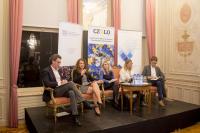News detail
Science Diplomacy: Connecting Science and Policy
On 15 October 2019, the Czech Liaison Office for Research, Development and Innovation (CZELO), together with its partners organised a debate on “Science Diplomacy: Connecting Science and Policy” in the Prague House, Brussels. The aim of the event was to provide the researchers and diplomats with a platform for discussion on the current state of Science Diplomacy in the member states and on the EU level and discuss linked future challenges. Topic related H2020 project S4D4C (“Using Science for/in Diplomacy for addressing global Challenges”), which aims to support current and future European Science Diplomacy in favour of European capacities, EU foreign policy and in particular the development of solutions of global challenges, was also introduced. The topic attracted more than 70 participants.
Mitchell Young (Charles University Prague) opened the debate by introducing the S4D4C project, which, among other things, asks how to define Science Diplomacy. In the end, however, the successful functioning of Science Diplomacy always depends on mutual relations among people and diplomatic delegations. Tamara Katuščák (Embassy of the Czech Republic in Brussels) supported the idea that politicians should trust scientists and make decisions based on scientific knowledge, and diplomats should discuss their topics more with scientists. However she alsohe stressed the need to pay attention to terminology and not to confuse diplomats with policy-makers, as diplomats only implement the political decisions of national authorities and thus have no say in its formation. The advantage is also if the politicians themselves are from the scientific environment. Maël Le Bail (French Embassy in Brussels) was concerned about this; it may be problematic as politicians and scientists do not work within the same timeframe. Quite often, politics requires immediate answers, scientists, on the other hand, verify results and need to devote time to their conclusions. Suvi Seppalainen (EEAS) agreed and added that the combination of science and politics quite often depends on whether the situation is appropriate and how it can be solved. However, she encourages the EU to base its actions more on scientific evidence. So far, it was successful while implementing sustainable EU objectives and climate change measures. During the discussion, Eliška Tomalová (Charles University) pointed out that science can cause both negative and positive emotions, and we sometimes worry too much about the effects of the bad news. On the other hand, we need to realize how important scientific outputs are for us. Effective policy-making would require changes at the national level, and researchers should work directly with ministries.
Partners of the event were the Czech Centre Brussels, Representation of the South Moravia Region to the EU and Prague House.



